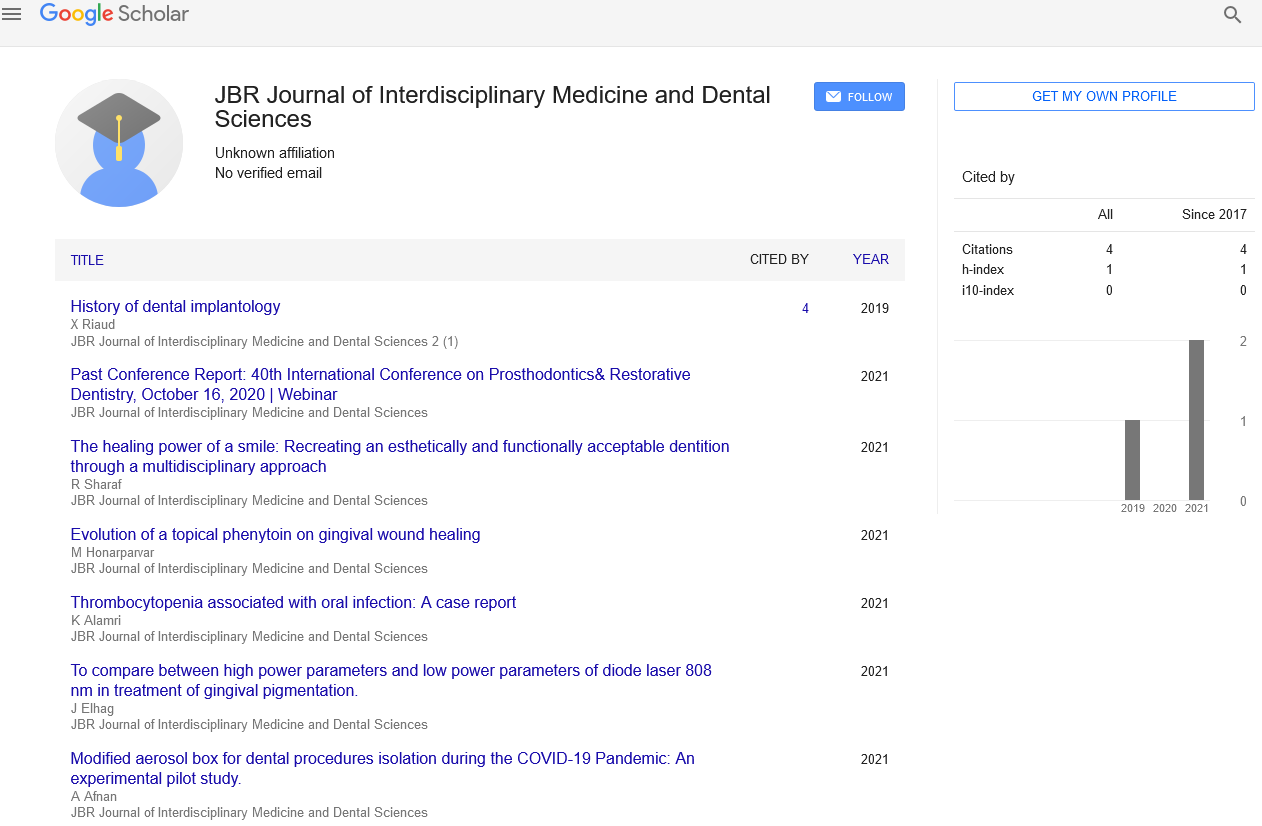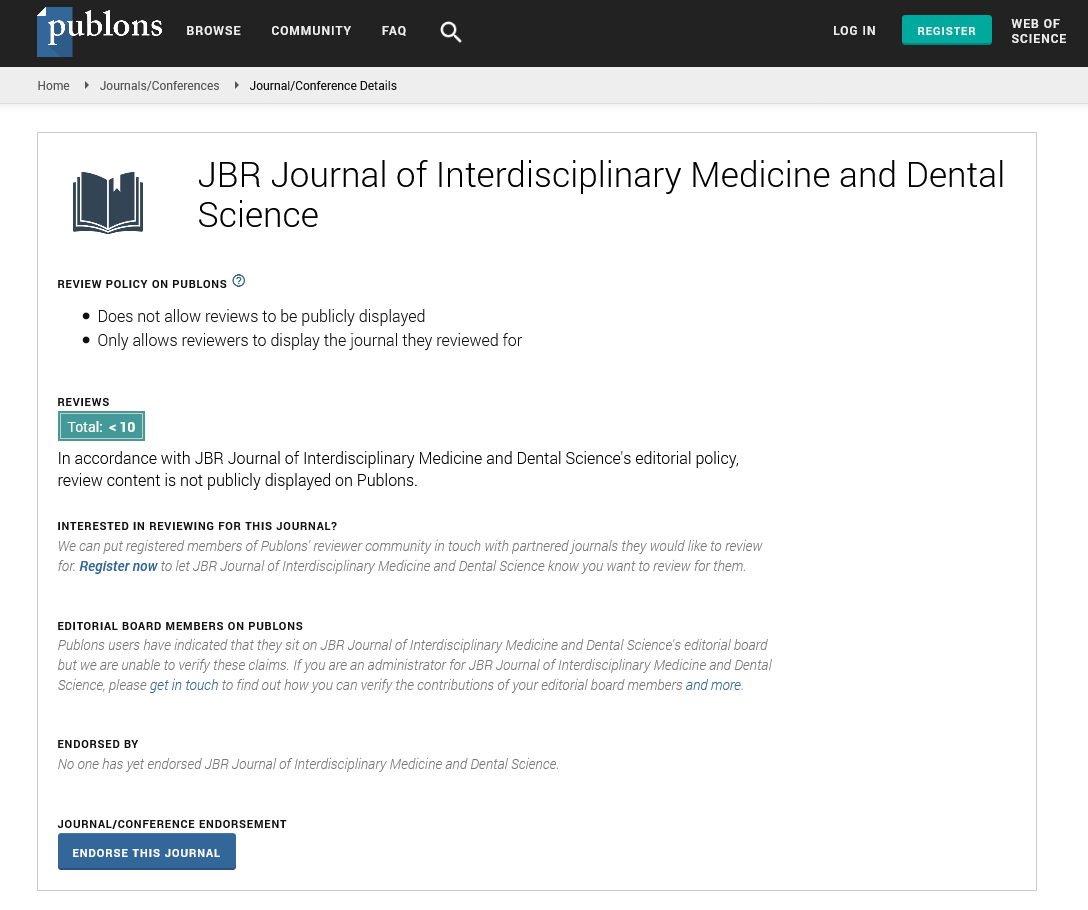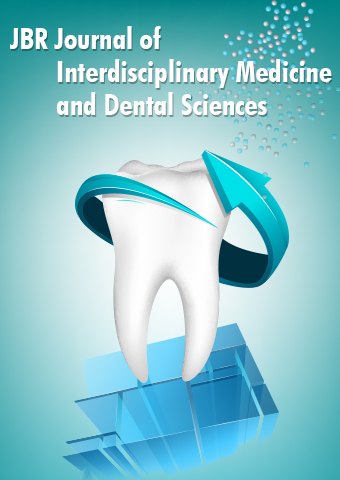Editorial - JBR Journal of Interdisciplinary Medicine and Dental Sciences (2023) Volume 6, Issue 2
Geriatric Dental Medicine: Caring for Senior Oral Health
Charlie Ilaria*
Departments of Biochemistry and Internal Medicine, University of Dental Science, Campus Bio-Medico University of Rome, Italy
Departments of Biochemistry and Internal Medicine, University of Dental Science, Campus Bio-Medico University of Rome, Italy
E-mail: Ilaria.charlie39@hotmail.com
Received: 02-Mar-2023, Manuscript No. JIMDS-23-93493; Editor assigned: 04-Mar-2023, PreQC No. JIMDS-23-93493(PQ); Reviewed: 18-Mar-2023, QC No. JIMDS-23-93493; Revised: 23-Mar-2023, Manuscript No. JIMDS-23-93493(R); Published: 30-Mar-2023, DOI: 10.37532/2376- 032X.2023.6(2).19-20
Abstract
As we age, our bodies undergo various changes, and our oral health is no exception. Geriatric dental medicine is a branch of dentistry that focuses on the oral health needs of older adults. With advances in healthcare, people are living longer, and it is essential to maintain good oral health to ensure a better quality of life.
Keywords
Dental Medicine ▪ Dental practices ▪ Health care
Introduction
Oral health is a vital aspect of overall health, and it plays a significant role in the well-being of older adults. Poor oral health can lead to tooth loss, gum disease, and oral cancer [1-2]. These conditions can cause pain, discomfort, and even difficulty in eating and speaking, which can lead to malnutrition, social isolation, and depression. [3].
Materials and Method
One of the most common oral health problems in older adults is gum disease or periodontal disease. It occurs when bacteria accumulate on the teeth and gums, causing inflammation and damage to the gums, teeth, and bones that support them. If left untreated, gum disease can lead to tooth loss and other health complications. Geriatric dental medicine aims to prevent and manage oral health problems in older adults. Dental professionals who specialize in this field are trained to understand the unique needs of older adults and develop individualized treatment plans [4].
One of the main challenges in geriatric dental medicine is that many older adults have multiple chronic health conditions that can affect their oral health. For example, conditions such as diabetes, arthritis, and heart disease can increase the risk of oral health problems. Dental professionals must work closely with other healthcare providers to ensure that patients receive the best possible care. Another challenge is that many older adults face barriers to accessing dental care. For example, they may have mobility issues that make it difficult to travel to the dentist or may not have dental insurance. Dental professionals who specialize in geriatric dental medicine must be aware of these barriers and work to overcome them.
Preventive care is a crucial aspect of geriatric dental medicine. Dental professionals encourage older adults to practice good oral hygiene habits, such as brushing twice a day, flossing daily, and using mouthwash. Regular dental check-ups and cleanings can help identify and treat oral health problems early on. Dental professionals may also recommend additional preventive measures, such as fluoride treatments, dental sealants, and oral cancer screenings. These measures can help prevent oral health problems and improve the overall health and well-being of older adults [5- 6].
In addition to preventive care, geriatric dental medicine also includes restorative and cosmetic dental treatments. Restorative treatments, such as fillings, crowns, and dentures, can help restore the function and appearance of damaged or missing teeth. Cosmetic treatments, such as teeth whitening and veneers, can improve the appearance of teeth and boost self-confidence. [7-8].
Conclusion
Dental professionals who specialize in geriatric dental medicine must also be knowledgeable about the medications that older adults take [9]. Many medications can have side effects that affect oral health. For example, some medications can cause dry mouth, which can lead to tooth decay and gum disease [10].
Conflict of Interest
None
Acknowledgement
None
References
- Tonesk X, Buchanan RG. An AAMC pilot study by 10 medical schools of clinical evaluation of students. J Med Educ. 62, 707–18 (1998).
- Mays N, Pope C. Qualitative research in health care. Assessing quality in qualitative research. BMJ. 320, 50–2 (2000).
- Kassebaum DG, Eaglen RH. Shortcomings in the evaluation of students’ clinical skills and behaviors in medical school. Acad Med. 74, 842–9 (1999).
- Siminoff LA, Zhang A, Colabianchi N et al. Factors that predict the referral of breast cancer patients onto clinical trials by their surgeons and medical oncologists. J Clin Oncol. 18, 1203– 11 (2000).
- Ross S, Grant A, Counsell C et al. Prescott RJ. Barriers to participation in randomised controlled trials. J Clin Epidemiol. 52, 1143– 56 (1999).
- Ding EL, Song Y, Malik VS et al. Sex differences of endogenous sex hormones and risk of type 2 diabetes. Jama. 295:1288-1299 (2006).
- Mohammed M, Al-Habori M, Abdullateef A et al. Impact of metabolic syndrome factors on testosterone and SHBG in type 2 diabetes mellitus and metabolic syndrome. J Diabetes Res. 492:78-98 (2018).
- Malipatil NS, Yadegarfar G, Lunt M et al. 14-year prospective outcome in 550 men with type 2 diabetes. Endocrinol Metab. 2: 3-4 (2019).
- Kelsey MM, Bjornstad P, McFann K et al. Testosterone concentration and insulin sensitivity in young men with type 1 and type 2 diabetes. Pediatr Diabetes. 17:184-190 (2016).
- Juneja R, Palmer JP. Type 1 1/2 diabetes: myth or reality? J Autoimmun. 29:65-83 (2009).
Google Scholar, Crossref, Indexed at
Google Scholar, Crossref, Indexed at
Google Scholar, Crossref, Indexed at
Google Scholar, Crossref, Indexed at
Google Scholar, Crossref, Indexed at
Google Scholar, Crossref, Indexed at
Google Scholar, Crossref, Indexed at
Google Scholar, Crossref, Indexed at
Google Scholar, Crossref, Indexed at


